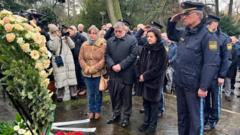In the wake of a tragic knife attack in Aschaffenburg, Germany, political leaders are reconsidering the nation's immigration policies. The attack, which claimed the lives of a two-year-old boy of Moroccan descent and a 41-year-old man, has intensified discussions surrounding border security and asylum rules. Friedrich Merz, a prominent figure in the conservative opposition, has expressed his intent to enforce permanent border controls, effectively closing the country to irregular migrants, including those eligible for protection.
The assault occurred on Wednesday, resulting in injuries to several others, and the suspect—an Afghan man who had been residing in Germany since 2022—now faces murder charges. Merz criticized the existing immigration approach, stating, "We see before us the ruins of 10 years of misguided asylum and immigration policy in Germany." He vowed to instruct the interior ministry to take assertive measures to manage borders from day one of his potential chancellorship.
Chancellor Olaf Scholz has also responded strongly, labeling the stabbing an "act of terror," although officials have not identified a terrorist motive. The immediate aftermath has seen Merz, whose Christian Democrats lead in the polls ahead of next month's elections, promise to enhance border security swiftly. He emphasized the need for a substantial increase in detention centers to facilitate deportations.
Merz's rhetoric aligns with a broader rightward shift in German politics, influenced by rising support for the far-right Alternative for Germany (AfD), which has aggressively targeted immigration policies. AfD leader Alice Weidel has advocated for urgent parliamentary measures to restrict irregular migration, citing the Aschaffenburg incident as a motivator for change.
Critics warn that the escalation of populist sentiments could merely strengthen far-right narratives, while some members of the current government caution against leveraging tragedy for political gain.
Scholz's coalition and competing parties are aware of the challenges of implementing such drastic changes, especially given the necessity of coalition-building in German politics. Nevertheless, the Aschaffenburg attack has sparked heated debate, pushing immigration and border control to the forefront of political discourse in the lead-up to the upcoming elections.




















